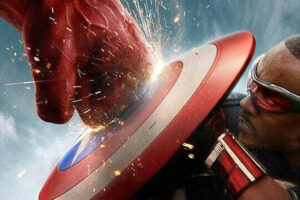By Brontë H. Lacsamana, Reporter
Movie Review
Captain America: Brave New World
Directed by Julius Onah
THIS fourth installment in the Captain America film franchise suffers from the fact that the character of Sam Wilson had taken up the mantle of Captain America in a previous TV show, in the process alienating a huge chunk of moviegoers who aren’t comic book fans and who don’t spend time on any of the Marvel TV series on Disney+. His appearance to these audience members is thus confusing.
His journey picks up where the TV show The Falcon and the Winter Solider left off, with Wilson — formerly the Falcon — accepting his new role as Captain America and coming to terms with the pressures of being the second iteration of a beloved hero, especially as a black man.
Captain America: Brave New World kicks off when he is thrust headfirst into an international incident where President Ross is almost assassinated. With certain friends at risk and a mysterious figure pulling the strings, he must discover the reason behind the nefarious global plot before the Red Hulk emerges from the shadows.
Despite the unfair pressure that comes with the job, Anthony Mackie excellently embodies the confident albeit very human physicality and sense of justice befitting Wilson’s Captain America (who does not have the enviable strength of a super-soldier and instead is burdened with an increasingly complex world that seeks to defend itself from cosmic evils). Mackie injects his own charm and humor into the role, more than making up for the fact that he isn’t the white hunk people expect.
All of this is confusing for those who don’t live and breathe superhero fiction as there are numerous ties with characters and events that last featured heavily about 20 Marvel movies ago. For example, Thaddeus “Thunderbolt” Ross, in addition to having a new face (he is now played by Harrison Ford after the passing of William Hurt), has an important character arc here as his ruthless general-turned-president transforms into the Red Hulk. But his starting point as the unforgiving military menace who hunted down and chased Bruce Banner (in 2008’s The Incredible Hulk, the Edward Norton version of the big green guy) off into hiding is crucial in getting the full force of this story. Since that original film, Hurt’s Ross has appeared here and there in a few Avengers movies, most recently in the 2020 Black Widow film. In Brave New World, we get constant references to the past, with ongoing drama between characters relegated to quick, snappy scenes.
It’s easy to dismiss the film’s geopolitics as laughable, with Japan seen as the threat to the United States’ control over the Celestial Island where humans now mine the super product adamantium (similar to Wakanda’s vibranium). China would have been the logical geopolitical power of choice for this. But the tragedy of Japan and America once again butting heads, with certain scenes set in the cherry blossom park in Washington DC donated by Japan in 1912, is a neat symbol of the calm that President Ross struggles to return to. (It is also an obvious tack to avoid offending China’s giant market for Marvel films.)
Ford does a wonderful job as he gradually becomes the Red Hulk. Known for playing lead characters (Han Solo, Indiana Jones), he embodies a truly pathetic man, one who did terrible things and is trying and failing to make up for it, his past catching up to him in the worst ways. His forced transformation shows just how great a Hulk film could be, interestingly rooted in the human machinations of a government that has Captain America and other superpowered pawns at their disposal.
Without spoiling anything, Tim Blake Nelson as the main antagonist, The Leader, is chilling and intriguing to watch, while Danny Ramirez gives life to the eager and energetic sidekick Torres that Wilson’s Captain America takes under his wing to train as the new Falcon. Carl Lumbly reprises his brilliant turn as the forgotten (and abused) black super-soldier Isaiah Bradley from The Falcon and the Winter Soldier. His endearing vulnerability and yearning to move on from his dark past is utilized in full here, his character getting involved in a plot that throws him back into notoriety.
We get frustratingly little of the scene-stealing Giancarlo Esposito as the criminal boss and assassin Sidewinder and frustratingly too much of Shira Haas (who is bland as well as controversial in real life for being an Israeli nationalist) as the ex-Black Widow-trained US agent Ruth Bat-Seraph.
The action excites at some parts, but Brave New World simply does not live up to the smoke-screen espionage-political-thriller-action-romp that it promises to be. Captain America and the Winter Soldier is still the best in that regard. On paper, this could have worked, but weighed down by the ties with multiverse-level events on the horizon (laid out over the next 20 or so Avenger-related films), it fails to execute a return to form for the Captain America franchise or even be an improvement on the recent lackluster string of Marvel titles.
It is serviceable, which is more than Sam Wilson deserves, the character now falling way too safely under the mantle of liberal tokenism (yay, black superhero!) even though there was potential to do more with it. It is standard superhero fare, at least coherent and fast-paced, but a mere shadow of the film it could have been.
